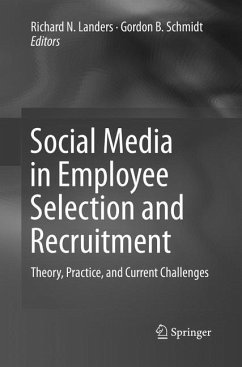
Deception and Egoistic Behavior: The Socially Desirable Response
An examination of deception and how egoistic behavior manifests in self-appraised job performance and biographical questionnaire responses
Versandkostenfrei!
Versandfertig in 6-10 Tagen
52,99 €
inkl. MwSt.

PAYBACK Punkte
26 °P sammeln!
Much research has been devoted to the study ofsocially desirable responding (SDR) on non-cognitivemeasures of job related characteristics. However, theegoistic component (ego-promotional andego-defensive) of SDR has not been given enoughattention in the literature. In this dissertation Idescribe deceptive behavior from an evolutionary andcultural perspective. The research on faking andsocially desirable responding is thoroughly exploredand the notions of ego promotional and ego defensiveresponding are introduced. These discussions lead totwo research studies examining 1) how egoisticbehavior a...
Much research has been devoted to the study of
socially desirable responding (SDR) on non-cognitive
measures of job related characteristics. However, the
egoistic component (ego-promotional and
ego-defensive) of SDR has not been given enough
attention in the literature. In this dissertation I
describe deceptive behavior from an evolutionary and
cultural perspective. The research on faking and
socially desirable responding is thoroughly explored
and the notions of ego promotional and ego defensive
responding are introduced. These discussions lead to
two research studies examining 1) how egoistic
behavior affects self appraised job performance and
responses to biographical questionnaire and 2)
whether SDR scales can measure actual deception in a
pre-employment testing context.
socially desirable responding (SDR) on non-cognitive
measures of job related characteristics. However, the
egoistic component (ego-promotional and
ego-defensive) of SDR has not been given enough
attention in the literature. In this dissertation I
describe deceptive behavior from an evolutionary and
cultural perspective. The research on faking and
socially desirable responding is thoroughly explored
and the notions of ego promotional and ego defensive
responding are introduced. These discussions lead to
two research studies examining 1) how egoistic
behavior affects self appraised job performance and
responses to biographical questionnaire and 2)
whether SDR scales can measure actual deception in a
pre-employment testing context.












